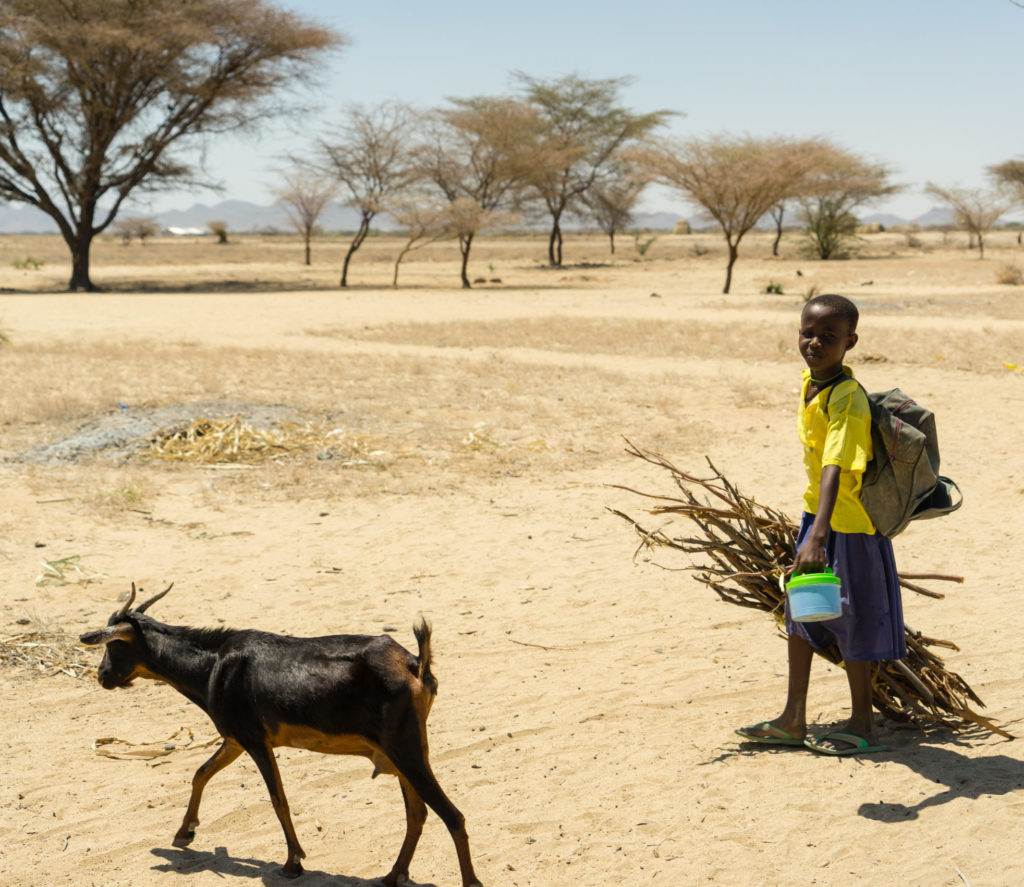We have to take our animals all the way to Uganda for water. That causes conflict with other communities who also rely on that water point; sometimes we have to give a goat or a cow as payment.
Tioko Loyoko from Lomokori
Funded by Grundfos Foundation, it also focuses on strengthening local water governance and water management systems.
Turkana is an arid and semi-arid region located in north-west Kenya. Persistent droughts make cultivating the land extremely difficult, and these are becoming more frequent due to climate change.
Communities tend to be nomadic pastoralists who relocate to find the most productive land, taking their livestock with them (goats, sheep and camels). As key household assets, keeping these animals alive is vital; but natural water sources are drying up and pasture land is diminishing.
In this marginalised region, more than 90% of the population live below the poverty level (USD$2 per day). Access to water is a huge challenge, with only approximately 40% of the Turkana population having access to clean water. This is not only due to the dry climate and worsening droughts, but also influenced by inadequate water resource development and management.
It is not uncommon to have to walk for up to 15 km to reach a water source. These are usually precarious holes dug into dry river beds, resulting in dirty water. Collecting is usually the job of women and girls, hindering their participation in educational as well as productive economic activities. In addition, rates of malnutrition and sanitation-related diseases are high, due to the scarcity of clean water.
We have to take our animals all the way to Uganda for water. That causes conflict with other communities who also rely on that water point; sometimes we have to give a goat or a cow as payment.
Tioko Loyoko from Lomokori

Title: Enhancing Water Access and Systems Strengthening for Arid and Semi-Arid Lands
Dates: Phase 1 – July 2019 to March 2021; phase 2 – January 2022 to January 2023
Location: Turkana county, Turkana South, Turkana East, Loima and Turkana Central sub-counties
Our role: Water, Sanitation and Hygiene (WASH) infrastructure development, livelihoods diversification, facilitating social behaviour change and system strengthening
Target group: Pastoralist communities and local water systems operators in Northern Kenya, Turkana County Government & Assembly, Water Resource Authority and National Environment Management Authority
Project Budget: £ 2.4 million
Theme: Climate resilience
Lead Donor: Grundfos Foundation
This project uses multiple approaches to improve access to clean drinkable water for Turkana’s population.
Firstly, boreholes and solar-powered water pump systems have been installed at eight sites identified by the county authority. In keeping with local priorities, these are not only serving the communities, but also their livestock. Through capacity-building initiatives, local technicians and Water User Associations have been established trained to maintain these community-managed water and irrigation points.
Secondly, training has been provided to improve WASH practises and establish livelihood diversification practises. In partnership with the Turkana Department of Agriculture and Irrigation, practical knowledge is being disseminated in subjects like community-managed irrigation systems, conservation agriculture, pest control and post-harvest considerations. Finally, policies and regulations relating to the county’s water management systems will be made more robust and comprehensive, including guidance on water tariffs. We will collaborate with local government to future-proof communities’ access to safe water.
I used to be away for the whole day collecting water from the river; I was tired from walking so far. Now there’s no problem. I have water whenever I need it. I’m clean and my children are clean.
Theresa Lomo in Nangorichoto
Water access is central to addressing poverty, livelihoods and health issues. By improving access to clean water and stronger water management systems, the project is addressing the following goals:
This project contributes to progress against at least three of the 17 SDGs.

Help us work with communities to tackle some of the world’s toughest problems.